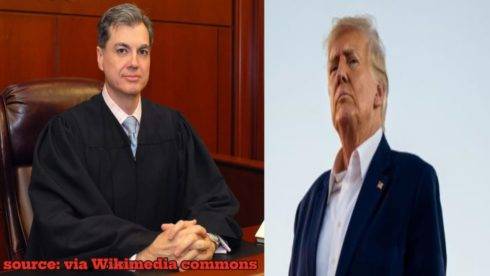Donald Trump’s New York criminal trial, Judge Juan Merchan has made a pivotal decision to safeguard the anonymity of jurors. This action, taken at the behest of the Manhattan district attorney’s office, is aimed at shielding jurors from potential harassment or violence, particularly from fervent Trump supporters. The judge’s ruling, which restricts access to juror names solely to Trump himself, the attorneys involved, and authorized staff and consultants, underscores the paramount importance of ensuring the safety and impartiality of the trial process.
This strategic move aligns with the district attorney’s compelling argument, which highlights Trump’s past behavior of publicly targeting jurors in previous legal proceedings. By limiting access to juror identities, the court aims to mitigate any potential threats of intimidation or interference that could compromise the trial’s integrity and impartiality.
Moreover, Judge Juan Merchan’s decision to withhold jurors’ addresses from Trump and his associates serves as an additional layer of protection against potential security risks. This measure underscores the gravity of safety concerns surrounding the trial and reflects the court’s commitment to upholding the principles of justice and fairness. By safeguarding the anonymity and security of jurors, the court not only ensures their physical safety but also upholds the integrity of the judicial process. This proactive approach to addressing safety concerns demonstrates a conscientious effort to uphold the rule of law and preserve the integrity of the legal system amidst heightened tensions and public scrutiny.
Judge’s Rationale for Restricting Juror Information
In a recent ruling, Judge Juan Merchan decisively addressed concerns surrounding juror safety by limiting access to juror information. By acknowledging the serious threats of bribery, jury tampering, and physical harm that jurors may encounter, the judge underscored the gravity of the safety concerns raised by the prosecution. This proactive measure reflects a commitment to safeguarding the integrity of the judicial process from external influences that could compromise its fairness and impartiality.
The court’s decision highlights the paramount importance of impartiality and the preservation of trial integrity. By granting the prosecution’s request to limit access to juror information, the court sends a resounding message that the safety and security of jurors are non-negotiable. This stance reaffirms the judiciary’s dedication to ensuring that jurors can fulfill their duty without fear of coercion or intimidation, thus upholding the fundamental principles of justice and fairness in legal proceedings.
Trump’s History of Attacking Jurors: Impact on the Trial
Trump’s track record of publicly targeting jurors in previous legal proceedings has raised alarms within the judicial system, prompting heightened security measures in his current trial. The Judge Juan Merchan’s decision to restrict access to juror information reflects a proactive effort to shield jurors from potential reprisals or harassment orchestrated by Trump or his supporters.
The trial’s proceedings are now unfolding under the shadow of Trump’s past behavior, highlighting the extraordinary measures needed to ensure a fair and impartial process. The courtroom drama surrounding Trump’s legal woes underscores the broader implications of his confrontational approach to the judicial system and its impact on the rule of law.
Implications of Treating Trump as a Security Risk
The court’s decision to treat Trump as a potential security risk underscores the unprecedented nature of his behavior and its implications for the legal process. By limiting access to juror information and addressing concerns about potential intimidation or violence, the judiciary is confronting the unique challenges posed by Trump’s volatile rhetoric and fanatical following.
Trump’s transformation from a former president to a perceived security threat reflects the erosion of norms and the politicization of the justice system. As the trial unfolds, the court’s handling of security concerns will be closely scrutinized, highlighting the broader societal tensions fueled by Trump’s polarizing influence.
Protecting Judicial Independence Amid Political Turmoil
The decision to restrict access to juror information underscores the judiciary’s commitment to upholding the principles of judicial independence and impartiality. In the face of political turmoil and partisan divisiveness, the court’s actions reaffirm its role as a bulwark against undue influence and external pressure.
By safeguarding the anonymity and safety of jurors, the judiciary seeks to insulate the trial process from the corrosive effects of partisan politics and public scrutiny. As the legal proceedings unfold, the court’s unwavering commitment to fairness and integrity will be tested amidst the swirling currents of political controversy.
Broader Ramifications for American Democracy
The unprecedented measures taken to protect jurors in Trump’s trial underscore the broader ramifications of his tumultuous presidency for American democracy. The erosion of trust in institutions, coupled with the specter of political violence, poses profound challenges to the rule of law and the functioning of democratic governance.
As the trial progresses, it serves as a sobering reminder of the fragility of democratic norms and the enduring legacy of Trump’s disruptive tenure. The court’s efforts to uphold the sanctity of the judicial process in the face of external threats reflect a steadfast commitment to preserving the foundations of democracy in the United States.
Table of Contents
Discover more from OGM News NG
Subscribe to get the latest posts sent to your email.














